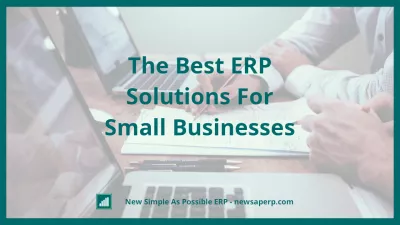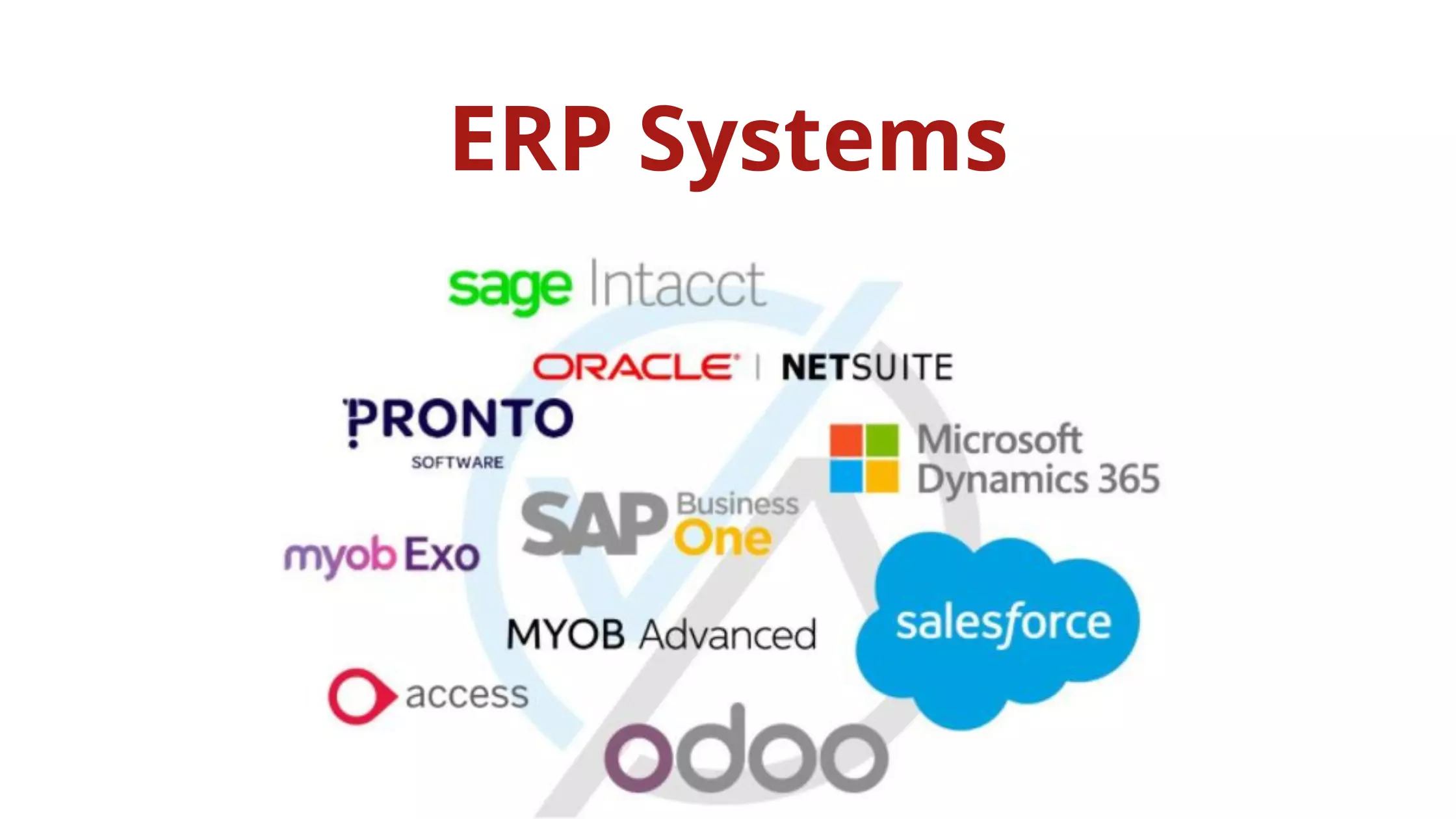Best ERP Software for Small and Medium Enterprises (SMEs) in 2024
Finding the right Enterprise Resource Planning (ERP) software can feel like navigating a maze. But don’t worry, you’re not alone! Many small and medium-sized enterprises (SMEs) struggle with this decision. Choosing the perfect ERP is crucial for streamlining operations, boosting efficiency, and ultimately, growing your business. This comprehensive guide will help you understand what to look for and highlight some top contenders in the market.
Understanding Your ERP Needs: A Foundation for Success
Before diving into specific software, it’s vital to assess your business’s unique needs. What are your biggest pain points? Are you struggling with inventory management, financial reporting, customer relationship management (CRM), or something else entirely? Answering these questions will help you narrow your search and avoid investing in features you don’t need.
Keywords: ERP software for SMEs, best ERP software, ERP selection, SME business needs, ERP implementation, ERP features, ERP cost, cloud ERP, on-premise ERP
Consider these key aspects:
- Business Size and Complexity: A small business with a simple structure will have different needs than a larger, more complex SME.
- Industry: Certain industries have specific requirements (e.g., manufacturing, retail, healthcare).
- Budget: ERP software comes in various price ranges. Determine your budget upfront to avoid costly surprises.
- Scalability: Choose software that can grow with your business. You don’t want to outgrow your system prematurely.
- Integration Capabilities: Can the software integrate with your existing systems (e.g., accounting software, CRM)?
- User-Friendliness: The software should be intuitive and easy for your team to use. Avoid complicated interfaces that hinder productivity.

| Feature | Importance for Small Businesses | Importance for Medium Businesses |
|---|---|---|
| Inventory Management | High | Very High |
| Financial Reporting | High | Very High |
| CRM | Medium | High |
| Manufacturing | Low (unless applicable) | High (if applicable) |
| Supply Chain | Medium | High |
| Reporting & Analytics | Medium | High |
Top ERP Software Options for SMEs:
The market offers a wide variety of ERP solutions, catering to different needs and budgets. Here are some of the leading contenders, categorized for clarity:
A. Cloud-Based ERP Solutions (Affordable and Scalable):
Cloud-based ERPs are increasingly popular among SMEs due to their affordability, accessibility, and scalability. They typically operate on a subscription model, eliminating the need for significant upfront investment.
- Zoho CRM & Zoho One: A robust all-in-one platform that seamlessly integrates CRM, project management, and other essential business functions. Ideal for businesses that value a unified system.
- Keywords: Zoho CRM, Zoho One, cloud ERP, all-in-one ERP, affordable ERP
- Xero: While primarily an accounting software, Xero offers robust financial management capabilities and integrates well with other business tools. A great choice for SMEs focused on financial control.
- Keywords: Xero, accounting software, financial management, ERP integration
- QuickBooks Online: Similar to Xero, QuickBooks Online excels in accounting and financial management. Its user-friendly interface makes it a popular choice for smaller businesses.
- Keywords: QuickBooks Online, accounting software, financial management, small business ERP
B. On-Premise ERP Solutions (More Control, Higher Investment):
On-premise ERPs are installed and maintained on your own servers. This provides greater control but requires a higher upfront investment and ongoing IT maintenance. They are often a better fit for larger SMEs with complex needs and dedicated IT staff.
- SAP Business One: A comprehensive solution suitable for growing businesses. It offers a wide range of functionalities but can be more complex to implement and maintain.
- Keywords: SAP Business One, on-premise ERP, comprehensive ERP, large SME ERP
- Microsoft Dynamics 365 Business Central: A powerful ERP system that integrates well with other Microsoft products. It offers a good balance between functionality and ease of use.
- Keywords: Microsoft Dynamics 365 Business Central, on-premise ERP, Microsoft ERP, integrated ERP
C. Open-Source ERP Solutions (Flexibility, Customization, Requires Technical Expertise):
Open-source ERPs are freely available and can be customized extensively. However, they typically require more technical expertise to implement and maintain.
- Odoo: A highly flexible and customizable ERP system with a vast library of modules. It’s a good choice for businesses with specific requirements that need tailored solutions.
- Keywords: Odoo, open-source ERP, customizable ERP, flexible ERP
Choosing the Right ERP: A Step-by-Step Guide
- Define your requirements: Clearly outline your business needs and priorities.
- Research potential solutions: Explore different ERP options based on your requirements and budget.
- Request demos: Try out the software before committing to a purchase.
- Consider implementation costs: Factor in the cost of implementation, training, and ongoing maintenance.
- Read reviews: See what other businesses have to say about the software.
- Choose a reputable vendor: Select a vendor with a proven track record and strong customer support.
| ERP Software | Pricing Model | Key Features | Best For |
|---|---|---|---|
| Zoho CRM & Zoho One | Subscription | CRM, Project Management, Inventory, Finance | Small businesses needing a unified system |
| Xero | Subscription | Accounting, Invoicing, Financial Reporting | Businesses prioritizing financial control |
| QuickBooks Online | Subscription | Accounting, Invoicing, Payroll | Small businesses with simple accounting needs |
| SAP Business One | On-premise license | Comprehensive ERP functionality | Growing businesses with complex needs |
| Microsoft Dynamics 365 Business Central | On-premise license | Comprehensive ERP functionality, Microsoft integration | Businesses using Microsoft products |
| Odoo | Open-source | Highly customizable, wide range of modules | Businesses needing highly tailored solutions |
Implementation and Ongoing Support:
Implementing an ERP system is a significant undertaking. Choose a vendor that provides comprehensive implementation support and ongoing training. Plan for potential disruptions during the transition and ensure your team is adequately trained to use the new system.
Conclusion:
Selecting the best ERP software for your SME is a crucial decision that can significantly impact your business’s efficiency and growth. By carefully assessing your needs, researching available options, and considering implementation factors, you can find a solution that empowers your business to thrive. Remember to prioritize user-friendliness, scalability, and integration capabilities to maximize your return on investment.
Frequently Asked Questions (FAQ):
- Q: How much does ERP software cost? A: The cost varies widely depending on the software, features, and implementation. Cloud-based solutions typically offer subscription models, while on-premise solutions require a larger upfront investment.
- Q: How long does it take to implement ERP software? A: Implementation time varies depending on the complexity of the system and your business’s size. It can range from a few weeks to several months.
- Q: What are the benefits of using ERP software? A: Benefits include improved efficiency, better inventory management, enhanced financial reporting, streamlined operations, and improved customer relationship management.
- Q: Do I need a dedicated IT team to manage ERP software? A: Cloud-based solutions often require less IT support than on-premise solutions. However, you should have someone responsible for managing the system and ensuring data security.
- Q: Can I integrate my existing systems with ERP software? A: Many ERP systems offer integration capabilities with other business tools. However, the level of integration varies depending on the software.
This article provides a broad overview. It’s recommended to conduct thorough research and possibly consult with an ERP consultant to determine the best solution for your specific business needs. Remember to always read the fine print and understand the terms and conditions before committing to any ERP software.


